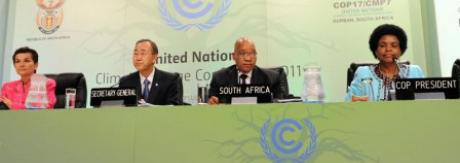
The climate after COP17
EU Climate Commissioner, Connie Hedegaard, admits that the agreement - Durban Platform – is not a big victory, but that after all it is a victory.
"We are not where we, ideally, ought to be. But we got the maximum out of this meeting and we have created a good framework for future climate action," said Connie Hedegaard, to the Danish newspaper Jyllands-Posten.
There is, according to Connie Hedegaard, to a new world order where all major economies have pledged to take responsibility and where it is determined that we are mutually dependent on each other, which is great progress.
It is no great victory for the environment, but it is a victory that 192 nations are now working together and going in the same direction. You have to crawl before you can walk, and this is a necessary step on the road to eventually getting all countries to commit to a legally binding climate change agreement.
Deep disappointment
Although the agreement in Durban might be a political success, it is not a success for the climate.
Climate Chief of the World Wildlife Foundation (WWF), John Nordbo, is both deeply disappointed with the agreement and worried about the world's climate.
There is nothing in the agreement on reducing greenhouse gases, only that the negotiations for a final agreement will be in place in a couple of years. Not before 2020 will the world's countries will have legal obligations to address climate change and curbing CO2 emissions.
Extension of the Kyoto Protocol
The Kyoto Protocol, which was signed in 1997 and ratified by 36 countries, expires in 2012. At COP17 the countries agreed on an extension of the Kyoto Protocol which will enter into force on 1 January 2013. The EU, Norway and Switzerland have promised to enter into this extension while the United States, Russia, Japan and Canada still refuse to join.
At COP18 in Qatar next year, it will be decided whether the extension of the Kyoto Protocol will run until 2017 or 2020.
Although the world's biggest CO2 emitters will not commit to the Kyoto Protocol or a renewal, committed most countries of the world after the COP15 in Copenhagen to voluntarily reduce emissions to the equivalent of 60% of what is needed to keeptemperature increases below 2 degrees. If they keep this promise, the future must be seen. One thing is certain, it seems that everyone now agrees that there should do something.
Source: Jyllands-Posten, 12 December 2011
Follow the developments within biorefining. hveiti regularly informs about our efforts to improve the environment.
Copyright © 2011 | Hveiti | Design Rabotnik




